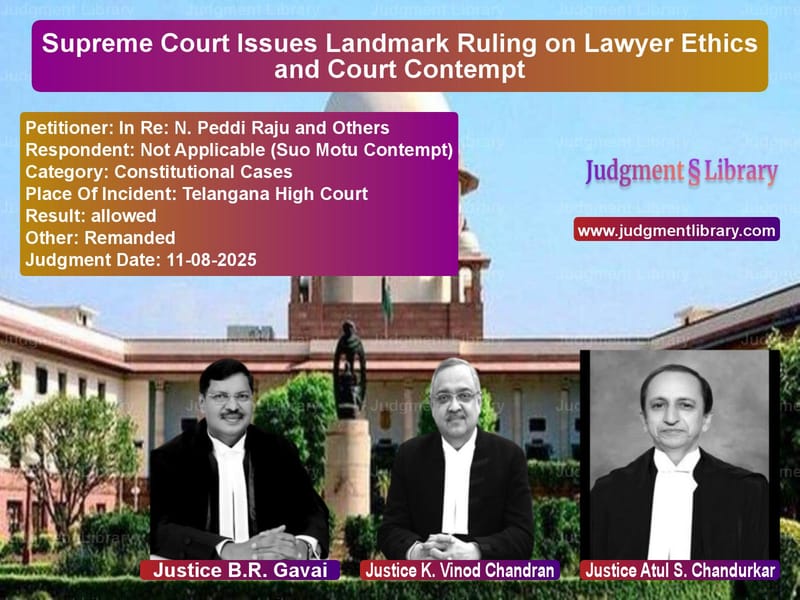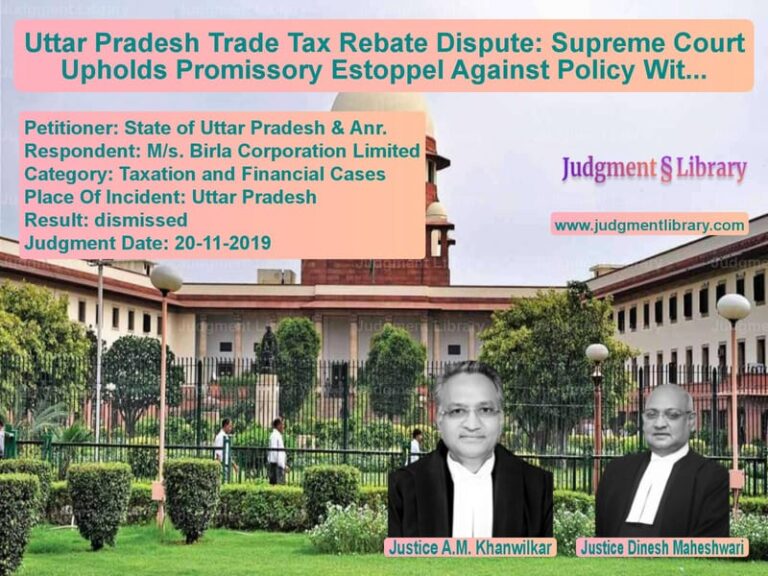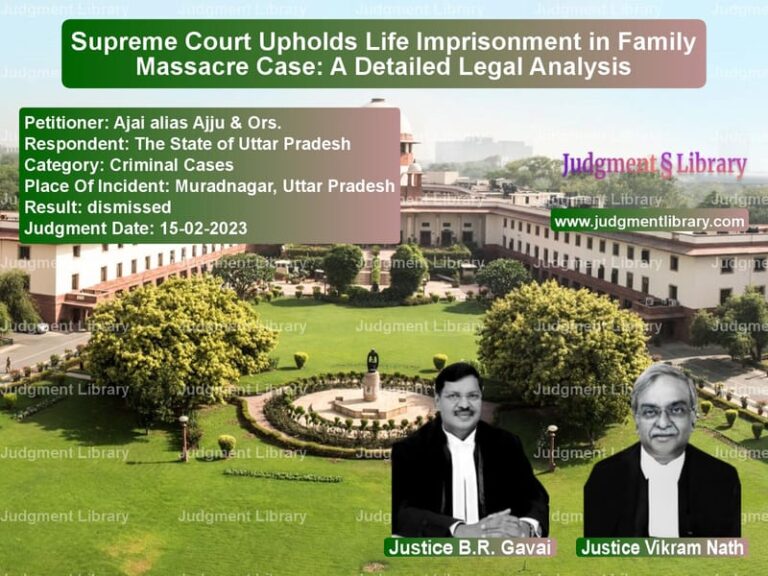Supreme Court Issues Landmark Ruling on Lawyer Ethics and Court Contempt
In a powerful judgment that reinforces the ethical foundations of the legal profession, the Supreme Court of India has taken strong exception to lawyers making scandalous allegations against judges and has clarified the fundamental principle that a lawyer’s duty to the court always prevails over duty to the client. The case originated from a suo moto contempt proceeding initiated by the Supreme Court against N. Peddi Raju and two lawyers who had filed a transfer petition containing serious allegations against a Telangana High Court judge.
The Controversial Transfer Petition
The matter began with Transfer Petition (Criminal) No. 613 of 2025, where the petitioners sought to transfer Criminal Petition No. 4162 of 2020 from the Telangana High Court to the Bombay High Court’s Nagpur Bench. The grounds for transfer included allegations that the Telangana High Court judge had shown partiality and procedural discrimination by allegedly giving the petitioner’s counsel only five minutes to argue the matter. The petition further made scandalous remarks suggesting that because a political figure was involved in the case, there existed a “likelihood of derailment of justice.”
The Supreme Court dismissed the transfer petition on July 29, 2025, but took serious note of the “scandalous and scurrilous remarks made against the learned Judge of the High Court.” The Court issued show cause notices not only to the main petitioner N. Peddi Raju but also to Advocate-on-Record Mr. Ritesh Patil and counsel Mr. Nitin Meshram, who had drafted and filed the petition, asking why contempt proceedings should not be initiated against them.
Constitutional Bench Precedent on Lawyer Ethics
The Supreme Court bench comprising Chief Justice B.R. Gavai and Justices K. Vinod Chandran and Atul S. Chandurkar extensively referred to the landmark Constitution Bench judgment in M.Y. Shareef and Another v. Hon’ble Judges of the High Court of Nagpur and Others (1954). The Court quoted the historic observations: “It cannot be denied that a section of the Bar is under an erroneous impression that when a counsel is acting in the interests of his client, or in accordance with his instructions he is discharging his legitimate duty to his client even when he signs an application or a pleading which contains matter scandalizing the Court. They think that when there is conflict between their obligations to the Court and their duty to the client, the latter prevails. This misconception has to be rooted out by a clear and emphatic pronouncement.”
The Court emphasized that “counsel who sign applications or pleadings containing matter scandalizing the Court without reasonably satisfying themselves about the prima facie existence of adequate grounds there for, with a view to prevent or delay the course of justice, are themselves guilty of contempt of Court, and that it is no duty of a counsel to his client to take any interest in such applications; on the other hand, his duty is to advise his client for refraining from making allegations of this nature in such applications.”
International Principles on Legal Ethics
The judgment extensively quoted from English jurisprudence, particularly the landmark case of Rondel v. Worsley, where Lord Reid had succinctly explained the conflicting duties of a lawyer: “Every counsel has a duty to his client fearlessly to raise every issue, advance every argument, and ask every question, however distasteful, which he thinks will help his client’s case. As an officer of the court concerned in the administration of justice, he has an overriding duty to the court, to the standards of his profession, and to the public, which may and often does lead to a conflict with his client’s wishes or with what the client thinks are his personal interests.”
The Court also referenced Lord Denning’s powerful words: “It is a mistake to suppose that he is the mouthpiece of his client to say what he wants: . . He must disregard the most specific instructions of his client, if they conflict with his duty to the court. The code which requires a barrister to do all this is not a code of law. It is a code of honour.”
Contemporary Trends and Judicial Concerns
The Supreme Court expressed serious concern about emerging trends in legal practice, observing: “We have noticed that nowadays it has become a trend amongst lawyers to criticize the Judges of the High Court or the Trial Court for no reason. It has also become a recurring trend that whenever the matter involves a political figure in a particular State, to allege that in that State a litigant may not get justice and therefore, transfer of the proceedings from that State to any other State is sought. Such practices cannot be countenanced.”
The Court made a significant constitutional observation about the status of High Court judges: “We are constrained to observe that within the constitutional edifice, the Judges of the High Court are in no way inferior to the Judges of the Supreme Court. Though, as an appellate Court to the High Court, this Court can affirm, reverse, modify or set aside the judgment of the High Court, it has no administrative control, either over the administration of the High Court or the Judges of the High Court. The Judges of the High Court are also Constitutional functionaries, and they enjoy the same immunity as is enjoyed by a Judge of the Supreme Court.”
The Sanctity of Judicial Independence
The Court strongly defended the independence of the judiciary, stating: “The Judges of the High Court are appointed under the Constitution of India and upon assuming the office, they take an oath to act without any fear or favour, affection or ill-will and to uphold the Constitution and the laws. To imply that because a political figure is involved in a case, and therefore, a holder of such a high constitutional office would not act independently, in our view, scandalizes the very institution of administration of justice.”
The Court categorically held that “merely on the basis that a petition involves a political figure in a State cannot constitute a ground to transfer the proceedings from the High Court of that State to the High Court of another State.”
Apology and Remedial Measures
While all three alleged contemnors had filed affidavits of apology, the Court noted that “the apology is tendered only to this Court. In our view, the scandalous allegations are made against the learned Judge of the High Court. Therefore, it would have been more appropriate for the alleged contemnors to tender an apology to the learned Judge of the High Court.”
The Court granted permission for the contemnors to tender unconditional apology before the Telangana High Court judge against whom the allegations were made. In an unusual step, the Court directed the Registrar General of the High Court to reopen the already disposed of Criminal Petition No. 4162 of 2020 solely for the purpose of allowing the contemnors to apologize before the concerned judge.
The Philosophy of Judicial Mercy
The Supreme Court reflected on its approach to contempt cases, referencing its recent judgment in N. Eswaranathan v. State: “We had observed that the majesty of law lies in not punishing someone, but in forgiving someone who acknowledges their mistake.” This philosophy guided the Court’s approach in giving the contemnors an opportunity to genuinely apologize.
The Court emphasized that “the Courts gain no pleasure in penalizing or sentencing the lawyers for acting in a manner which would amount to Contempt of this Court,” indicating that the primary purpose of contempt jurisdiction is corrective rather than punitive.
Procedural Directions and Timeline
The Court established a clear timeline for the apology process, directing that the matter be reopened within one week and the unconditional apology be tendered before the High Court judge within one week of reopening. The High Court judge was given one week to decide on accepting the apology, after which the Supreme Court would consider the apology tendered before it.
The Court also showed flexibility by allowing the parties to file affidavits of apology through email or other permissible modes and permitting appearance through video conference if necessary.
Broader Implications for Legal Profession
This judgment serves as a crucial reminder to the legal community about professional ethics and responsibilities. It reinforces that lawyers are not mere mouthpieces of their clients but are first and foremost officers of the court with overriding duties to maintain the dignity and integrity of the judicial process.
The ruling particularly addresses the growing tendency among some lawyers to make baseless allegations against judges and seek transfers based on unsubstantiated claims of bias, especially in cases involving political figures. By requiring apologies to be tendered directly to the judge concerned, the Court emphasizes the importance of maintaining respectful relationships within the legal ecosystem.
Conclusion
The Supreme Court’s judgment in the N. Peddi Raju contempt case represents a significant reinforcement of legal ethics and professional standards. By clearly establishing that a lawyer’s duty to the court prevails over duty to the client, and by taking strong exception to scandalous allegations against judges, the Court has sent a powerful message about maintaining the dignity and independence of the judiciary.
While showing mercy by giving the contemnors an opportunity to genuinely apologize, the Court has drawn clear boundaries for professional conduct. This judgment will likely serve as an important precedent for future cases involving allegations against judges and will hopefully contribute to maintaining the highest standards of professionalism in the legal community.
The case demonstrates the Supreme Court’s role as the guardian of judicial integrity while balancing the need for corrective justice with the principles of mercy and rehabilitation. It reaffirms that the legal profession’s honor code requires lawyers to be not just advocates for their clients but guardians of the justice system itself.
Petitioner Name: In Re: N. Peddi Raju and Others.Respondent Name: Not Applicable (Suo Motu Contempt).Judgment By: Justice B.R. Gavai, Justice K. Vinod Chandran, Justice Atul S. Chandurkar.Place Of Incident: Telangana High Court.Judgment Date: 11-08-2025.Result: allowed.
Don’t miss out on the full details! Download the complete judgment in PDF format below and gain valuable insights instantly!
Download Judgment: in-re-n.-peddi-raju-vs-not-applicable-(suo-supreme-court-of-india-judgment-dated-11-08-2025.pdf
Directly Download Judgment: Directly download this Judgment
See all petitions in Contempt Of Court cases
See all petitions in Legal Malpractice
See all petitions in Constitution Interpretation
See all petitions in Fundamental Rights
See all petitions in Separation of Powers
See all petitions in Judgment by B R Gavai
See all petitions in Judgment by K. Vinod Chandran
See all petitions in Judgment by Atul S. Chandurkar
See all petitions in allowed
See all petitions in Remanded
See all petitions in supreme court of India judgments August 2025
See all petitions in 2025 judgments
See all posts in Constitutional Cases Category
See all allowed petitions in Constitutional Cases Category
See all Dismissed petitions in Constitutional Cases Category
See all partially allowed petitions in Constitutional Cases Category







